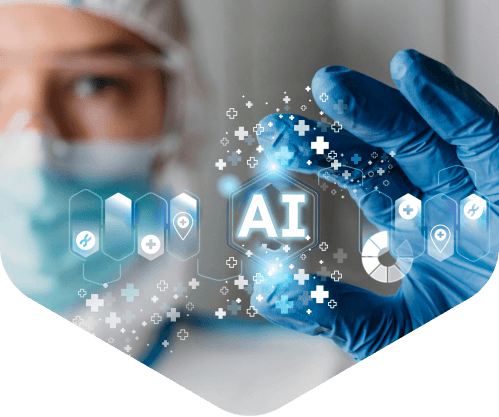AI Trends in Healthcare in 2024
The healthcare industry uses artificial intelligence (AI) solutions in a variety of ways. In addition, new uses for healthcare AI seem to come to market every few months—especially with the explosion in AI innovation over the last two years.
AI trends in healthcare have been exploring the use of AI to assist healthcare providers in many aspects of patient care and administrative processes. Much of this activity centers around Big Data.
In 2018, the United States alone generated 150 exabytes (150 billion gigabytes) of healthcare data. And according to projections from RBC Capital, the healthcare industry currently generates approximately 30% of the world’s data.
“By 2025,” RBC states, “the compound annual growth rate of data for healthcare will reach 36%. That’s 6% faster than manufacturing, 10% faster than financial services, and 11% faster than media and entertainment.”
Healthcare AI solutions quickly became necessary for efficiently processing and analyzing this flood of data. Thanks to AI, providers can improve existing tools, techniques, and treatments. AI enables doctors and hospitals to rapidly overcome some of the biggest challenges in delivering quality care.
But AI is a versatile technology with many applications. So when we talk about “healthcare AI,” what exactly do we mean? What are the AI in healthcare trends today, and what is on the horizon?
This article looks at the latest AI trends in healthcare.
What is Healthcare AI?
Healthcare AI is the medical application of artificial intelligence technologies such as machine learning, deep learning, and similar emerging technologies.
The healthcare industry uses AI and data engineering to improve the analysis and processing of patient data, insurance claims, and other medical data.
AI helps improve health outcomes, assists with complex surgeries, and reduces operating costs for health organizations and pharmaceutical manufacturers.
AI and Machine Learning
Providers and health researchers use AI and machine learning to analyze vast quantities of medical data.
Machine learning solutions help accurately predict disease outbreaks and progression. Diagnosticians use it to interpret x-rays and other medical test results. It also enables doctors to determine what treatments are likely to be most successful for an individual patient.
The most common use of machine learning in healthcare is in precision medicine—medical care that crunches Big Data to find highly effective treatments for particular groups of patients, often by using genetic or molecular profiling. Precision medicine has made giant leaps forward, thanks to machine learning.
AI and Deep Learning
Along with machine learning, AI uses deep learning, a type of machine learning that uses a layered algorithmic architecture to analyze data.
In simpler terms, deep learning filters data through multiple layers. Each layer learns from the output of the previous one to make better correlations and connections, thus steadily improving the results.
A common use of deep learning is natural language processing (NLP) for speech recognition. One of the growing AI in healthcare trends is using NLP applications to understand and classify clinical documentation. NLP systems help providers analyze unstructured clinical notes about patients and gain valuable insights that help them deliver better patient care.
AI for Diagnosis and Treatment
Medical errors cause preventable harm and death for hundreds of thousands of hospital patients each year. These errors are often due to incomplete medical histories and providers dealing with staggering caseloads—too many patients, not enough information.
Healthcare AI shows great promise for avoiding these kinds of medical errors. AI solutions are unaffected by heavy caseloads, and they can rapidly access all known data for a patient. Additionally, AI can predict and diagnose disease faster than most healthcare professionals.
Unfortunately, integration issues have prevented the widespread adoption of healthcare AI. EHR software vendors have been slow to incorporate AI into their products.
As a result, healthcare providers must tackle complex integration projects or partner with a healthcare software development company. Either way, the project team requires knowledge of AI, machine learning, and EHR integration experience.
Administrative AI
Many healthcare organizations are turning to AI for administrative data management. AI can accelerate and reduce errors in claims processing, clinical documentation, revenue cycle management, medical records management, and other administrative processes.
For example, insurers and providers must verify millions of claims every day. Using an AI solution to identify and correct coding errors and incorrect claims can save these organizations significant time, money, and resources.
AI and Drug Discovery
Developing new medications costs millions of dollars. Much of that cost comes from humans spending thousands of hours on research and development. Clinical trials alone can cost millions, depending on the class of the drug. And only 10% of drugs make it to market, even after the clinical trial phase.
AI represents a paradigm shift in drug discovery and clinical development. AI’s efficiency, accuracy, and speed of data analysis can trim significant hours from the discovery process.
Healthcare AI for Robotic Surgery
One of the leading AI in healthcare trends has been the refinement of surgical robots. The medical droids seen in science-fiction movies may be just around the corner. AI-enhanced robots are already helping surgeons perform complex procedures like open-heart surgery.
AI-powered robotic surgical suites give doctors a greater degree of precision, flexibility, and control they wouldn’t otherwise have. As a result, robot-assisted surgeries reduce surgery-related complications, cause less post-surgery pain, and result in faster recovery times.
Surgical robots even help train the next generation of surgeons.
What’s Next for Healthcare AI?
Healthcare innovators constantly develop new uses for AI and improve existing solutions. According to Precedence Research, the global artificial intelligence in healthcare market size will hit around $187.95 billion by 2030.
However, healthcare AI does face challenges. Even though AI trends in healthcare are growing, it remains to be seen how quickly providers and healthcare organizations will adopt the technology.
One thing is certain: AI is here to stay. The increasing flood of healthcare data requires it, and the providers that adopt AI solutions will be able to deliver a much higher level of care quality.
If you want to integrate AI into your organization and need help with custom AI solution development, contact the experts at Taazaa.


